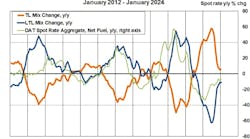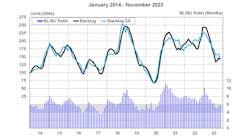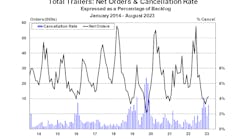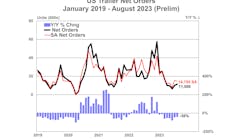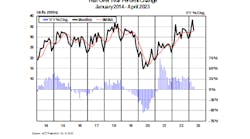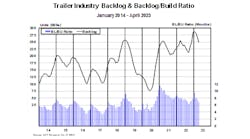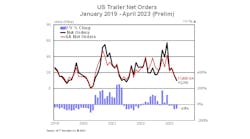The Europeans saw it coming.
Speaking at the IAA Commercial Vehicles Show in Hanover, Germany, two representatives from Global Insights seemed prescient in delivering “Trends and Opportunities in the Global Truck Industry” during the world's largest truck and trailer show September 26.
One of the threads that tied together the string of facts and statistics from throughout the globe: things are shaky in the United States, and the economy in Europe will feel it.
Timo Klein, senior economist for Global Insight, led off the session with a presentation titled “European and World Economic Outlook.”
“Despite development of regional markets and trade among emerging markets, there is no way to avoid being hurt when 18% of the global economy (U S consumer spending) decelerates from 3% to 0% and another 18% (consumption among member nations of the European Union) slows as well,” Klein said.
Why the global slowdown? The world economy is facing a double shock — financial crisis along with inflationary pressure, according to Klein.
The chaos that culminated with the precipitous fall on Wall Street three days after Klein spoke had been brewing for some time. For example:
-
Annualized world GDP growth decelerated from 2.9% in the first quarter to 2.3% in the second. Klein said weakness was pronounced in Europe and Japan, with downward pressure in the United States expected later in the year.
-
The credit crunch has lifted market interest rates, thereby tightening policy, Klein said. The three-month euro rate hit 4.97%, the highest in almost eight years.
-
Reduced credit availability is likely to dampen business investment and consumer spending.
-
European banks are significantly exposed to the U S subprime mortgage crisis.
-
Europe was beginning to experience its own corrections in the housing market. Klein said problems in the housing market were “serious” in Spain, Ireland, and the U K. France, the Netherlands, and Belgium also were reporting problems in their housing markets.
-
Business and consumer confidence peaked in late 2006 and have been trending downward since then.
-
Expect sharp overall losses in European equity markets.
-
Growth rates have varied widely, but most nations have been experiencing declining growth rates at least since 2007, including North America, Western Europe, Eastern Europe, and Japan. Global Insight expects the downward trend to continue among major industrialized nations through 2008 and into 2009 before economic growth turns sharply upward in 2010.
“Trade-dependent economies are affected first,” Klein said. “Strong domestic demand temporarily supports growth in other markets.”
Even China, which has shown itself to be an economic powerhouse in recent years, will stall because the weakening economies in other nations will reduce demand for Chinese goods. The slowing will be relative, however. Klein expects China to overtake Germany in GDP this year and to surpass Japan next year. By 2026, the gross domestic product of China will exceed that of the United States to become the world's largest.
European action
Klein listed some of the action that the Europeans had been taking prior to his September 26 address. Among them:
-
The European Central Bank has been active in providing liquidity.
-
The European Central Bank was to be asked to provide more loans to medium and small businesses.
-
Spain provided a fiscal stimulus package, but other countries had ruled out any major stimulus to their economies. Spain was able to afford a stimulus package, Klein said, because the nation had been running a budgetary surplus.
On the bright side
Klein listed some of the positives, including:
-
Oil prices had begun to retreat.
-
Corporate balance sheets have been generally healthy for an extended period of time.
-
European trade is largely intra-regional, helping insulate the market from global slowdown.
-
Eastern Europe and oil-producing countries are healthy export markets.
But, Klein said, consumers could not be expected to bolster the economy. The reasons: high food and energy prices, higher interest rates, tightening credit, slower employment growth, housing crunch, and the fact that consumer confidence sank to a 64-month low in July before edging up in August.
Long-term consumer concerns included pensions, labor market reforms, healthcare, and welfare systems.
Outlook for Europe
Growth of Eurozone GDP is expected to moderate from 2.6% in 2007 to 1.2% in 2008 and 0.8% in 2009, Klein said. He expects GDP to recover in 2010, moving up 1.7%.
Eurozone consumer price inflation has peaked and will trend lower in reaction to slowing growth and lower oil prices.
Klein said the euro will remain below its peak of $1.60. Expect to pay $1.50 for a euro by the end of 2008, $1.45 by the end of 2009, and $1.39 by the end of 2010.
Klein said that he sees nothing that would point to anything as severe as the Great Depression.
